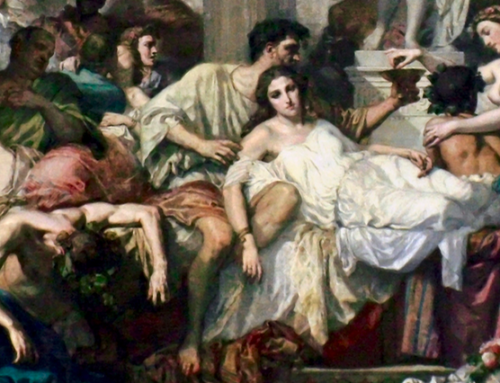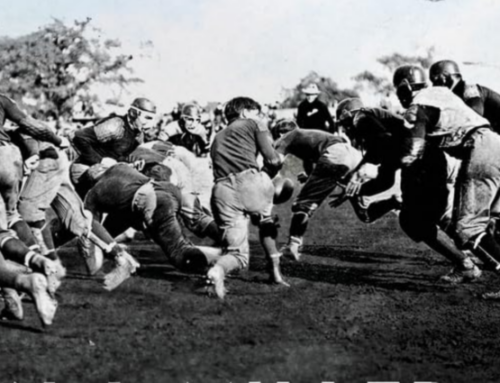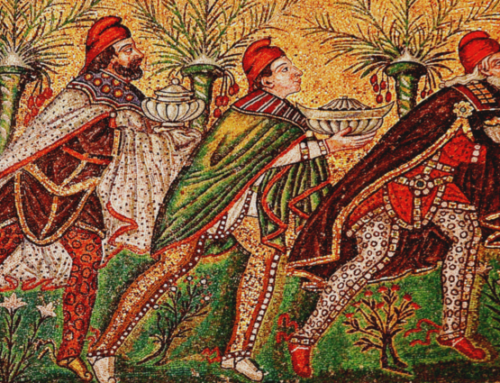(click here for Post-Prosperity I: Land of Opportunity)
Happiness, says the wicked Ambrose Bierce, is an “agreeable sensation arising from contemplating the misery of another” (The Devil’s Dictionary, 1911). There was so much misery in the world (at least misery that most people could agree was misery) from about 1930-1945 that, if Bierce were correct, one would expect to find more expressions of happiness than leap off the pages and images of post-WWII American culture.
The 1950s, so maligned by ignorant generations who didn’t live it, gave us the best picture of the contradictions the ambiguous idea of prosperity offered the world, perhaps in the history of what we still call Western Civilization. Progressives hated the decade, being so stupid as not to see what Elvis and Marilyn and Arthur Miller and Tennessee and Marlon—and yes, their anti-hero, Tail Gunner Joe, handed them to take apart politically what the American Century had offered.
We were prosperous in that decade, although most of the fashionable economists—J.K. Galbraith, for example, who got rich telling us we were really poor, tried their best to make us unhappy when we thought we were happy. They parlayed that into what Robert Frost called “pigging together” in the Great Society of the 1960s, which has ensured the decline of our prosperity.
The irony of all this is that the most popular person on the most visible proof of prosperity, television, was a Catholic Bishop. America’s Bishop, his biographer Thomas Reeves calls him. Fulton J. Sheen did “Life Is Worth Living” on the Du Mont network and ABC (in fact he made ABC) from February 12, 1952 until October, 1957 when he “retired” from television at the order of Cardinal Spellman of New York. He won an Emmy as TV’s most outstanding personality in 1952 and was heard by more people than any bishop in history, and watched by more people than “I Love Lucy” or “Gunsmoke.” The idiots who have so far written histories of the 50s often group him with Norman Vincent Peale’s feelgood version of lukewarm dishwater Christianity, but nothing could be further from the truth.
Bishop Sheen brought Thomas Aquinas to the United States in his 1925 book, God and Intelligence (an astonishing book, a critique of all of modern philosophy from the perspective of a Christian Humanist). He also devastated “Sigmund Fraud” in Peace of Soul (1949) and wrote the best book ever written on communism (except perhaps for Whittaker Chambers’ Witness), Communism and the Conscience of the West (1948). Before TV, he had intellectually marginalized the two great evil ideologies of the twentieth century.
Nor did he on television water things down. He walked onto a spare set, dressed as a bishop, wrote “JMJ” at the top of a folding blackboard, and talked for twenty-seven minutes (he once said that a successful talk is of whatever length but best wrapped up with a two-minute memorized ending) about things that Americans knew in their hearts were important. “Why Work Is Boring,” for example; or “Fatigue”; or “How to Talk”; or “Women Who Do Not Fail; or “Teen-Agers.” He never talked politics, except to dissect the evils of ideology—about one in five of his shows, and he never identified himself as a Catholic. About 70% of his audience was non-Catholic. It can be well argued that he killed America’s historic anti-Catholicism with kindness. I, as a 12-17 year old Episcopalian, rarely missed his broadcasts. I didn’t know it at the time, but he gave me a pretty good grounding in Thomistic philosophy and an effective inoculation against 60s hedonism at exactly the time I was most receptive to things that teenagers don’t want to hear.
Bishop Sheen told us that man, “Being made to image of God, he leaves the impress of his reason on what he does. Thus in all work there are two elements: the result produced and the human intention or purpose, which includes self-perfection or development.” Work must do something, but it also must reach somewhere. In this industrial age the dissatisfaction of workers is often “the rightful protest against the defacement of the Divine Image within them, because they know that, being the noblest creatures on earth, they may not be degraded to the order of chemicals, matter, and economics.” Jesus was one of our own, “a capitalist who became a laborer,” the God who dignified work by doing it. There is no chasm between capital and labor; there is only a profound spiritual disconnect, and one that cannot be rectified by mere prosperity.
Our economy is not economic; it is moral, and it precedes whatever is merely material. That’s why people watched Bishop Sheen. The December 18, 2010 issue of The Economist, however, would have us believe otherwise. In a well researched article, “The U-bend of Life,” we are informed that we are relatively happy at 18, hit the low point at 46, and sometime thereafter get happy again. Furthermore, they seem to think that happiness is reducible to quantities. Did you know that you are happier when you have a job than when you don’t? How about, happiness is partly a function of good health? The quantifiers they interviewed didn’t get much beyond Sophocles, who was overjoyed when liberated from sex sometime after he reached three score years and ten, but of course in our age of numbers there is nothing quite like scoring bigger than the other guy.
I am particularly interested in the fact that the numbers show Dutch and Danes and Finlanders happier than most of us. Do you suppose that has anything to do with how many of us are (not) rushing off to those countries? Do you think the interviewers asked the people who live near muslim no-go zones in the Netherlands? Another quantifier fellow, whose name I did not catch, was caught saying on Fox and Friends the other morning that one great predictor of happiness is faith in God (of whatever description), another is security of local community, and another the stability of one’s family. Gosh, that’s a new one! By almost everybody’s so-called measure, prosperity doesn’t rank very high, at least absent the other, more telling criteria. The same guy on Fox also said that a reliable indicator of unhappiness is an hour commute. You could have read all this in Aristotle, Dante, or, for that matter, in Genesis.
My priest likes to say that the Church has never been better than when it was poor and under siege. Given what I know about happiness and what I know about economists, it is probably good to look forward to the not too distant day when the Chinese pass us over and hold the world’s strongest “economy.” Ask them how happy they are.
Books on the topic of this essay may be found in The Imaginative Conservative Bookstore. The Imaginative Conservative applies the principle of appreciation to the discussion of culture and politics—we approach dialogue with magnanimity rather than with mere civility. Will you help us remain a refreshing oasis in the increasingly contentious arena of modern discourse? Please consider donating now.








Peter Kreeft draws several parallels between ancient Israel and the modern church in America. "If the Lord loves His Church, He will make her small and persecuted. And the blood of the martyrs will be the seed of the Church, and a new spring will come." I think that's true.
So much of the happiness research in psychology basically re-states the Beatitudes and the philosophy of the "Democracy of the Dead." Wealth, after you reach a certain minimum standard of living, does not correlate with happiness. What matters is not money, or "success" but goodness, truth, beauty and meaning.
Indeed, an hour-long commute is an indicator of unhappiness. I can't argue with that.
Stuck in Trinidad a few years back, I watched on their idiosyncratic cable television service old re-runs of Bishop Sheen's programme that I had not seen since my childhood (and how my entire family loved them then). Fifty or more years later, I was spellbound by his content and showmanship, and how not a word seemed dated. Get the recordings if you can find them and you are guaranteed many evenings of fine, nourishing entertainment. Orotund of voice, perhaps a bit over-dressed in his cape, on a bare set that neither changed nor contained guests (much less celebrities, Heaven forfend!) his was an act that would only have been given a chance in the early days of television – and what a show it was! John's data on the size and complexion of Sheen's audience is as fascinating as it is ultimately not surprising. The market niche that he filled so well was not a Nielsen bracket of age, sex or income: instead he filled a moral vacuum that most everyone shares. I rarely watch television – apart from The Queen's Speech at Christmas or when I am trapped abroad in a foreign hotel without enough good books. But there seems to be an American Catholic cable network that is often good viewing and addresses matters of morality and faith. But, crikey, nobody's as good as Bishop Sheen. Get the recordings: I'm going to. Thanks, John!
Stephen Masty
Well Done! God Love You.
How to Meet Communism Part I
http://youtu.be/WJrvmF6TucM